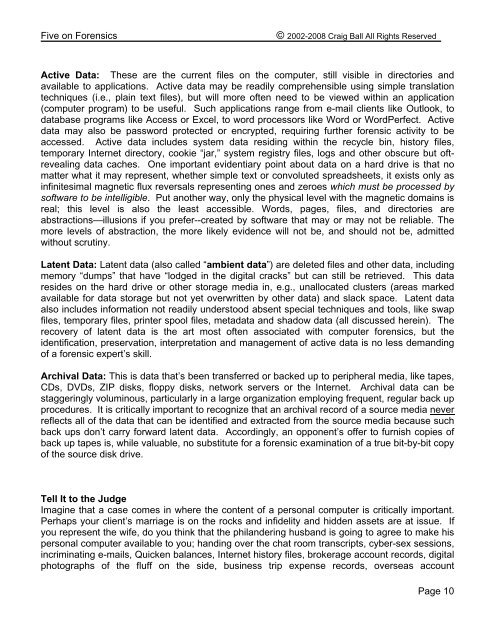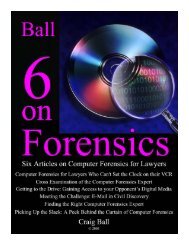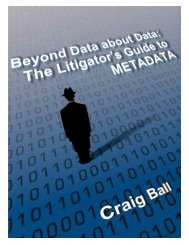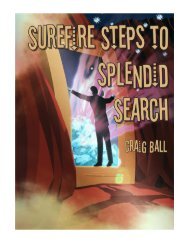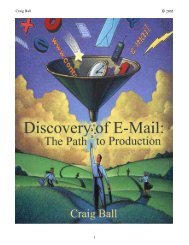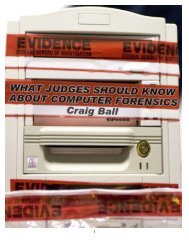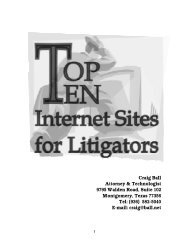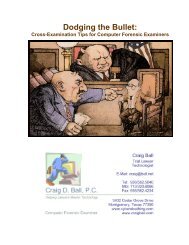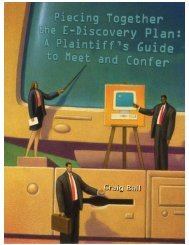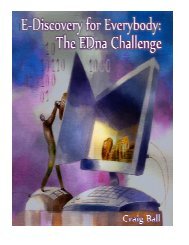Five on Forensics Page 1 - Craig Ball
Five on Forensics Page 1 - Craig Ball
Five on Forensics Page 1 - Craig Ball
Create successful ePaper yourself
Turn your PDF publications into a flip-book with our unique Google optimized e-Paper software.
<str<strong>on</strong>g>Five</str<strong>on</strong>g> <strong>on</strong> <strong>Forensics</strong><br />
© 2002-2008 <strong>Craig</strong> <strong>Ball</strong> All Rights Reserved<br />
Active Data: These are the current files <strong>on</strong> the computer, still visible in directories and<br />
available to applicati<strong>on</strong>s. Active data may be readily comprehensible using simple translati<strong>on</strong><br />
techniques (i.e., plain text files), but will more often need to be viewed within an applicati<strong>on</strong><br />
(computer program) to be useful. Such applicati<strong>on</strong>s range from e-mail clients like Outlook, to<br />
database programs like Access or Excel, to word processors like Word or WordPerfect. Active<br />
data may also be password protected or encrypted, requiring further forensic activity to be<br />
accessed. Active data includes system data residing within the recycle bin, history files,<br />
temporary Internet directory, cookie “jar,” system registry files, logs and other obscure but oftrevealing<br />
data caches. One important evidentiary point about data <strong>on</strong> a hard drive is that no<br />
matter what it may represent, whether simple text or c<strong>on</strong>voluted spreadsheets, it exists <strong>on</strong>ly as<br />
infinitesimal magnetic flux reversals representing <strong>on</strong>es and zeroes which must be processed by<br />
software to be intelligible. Put another way, <strong>on</strong>ly the physical level with the magnetic domains is<br />
real; this level is also the least accessible. Words, pages, files, and directories are<br />
abstracti<strong>on</strong>s—illusi<strong>on</strong>s if you prefer--created by software that may or may not be reliable. The<br />
more levels of abstracti<strong>on</strong>, the more likely evidence will not be, and should not be, admitted<br />
without scrutiny.<br />
Latent Data: Latent data (also called “ambient data”) are deleted files and other data, including<br />
memory “dumps” that have “lodged in the digital cracks” but can still be retrieved. This data<br />
resides <strong>on</strong> the hard drive or other storage media in, e.g., unallocated clusters (areas marked<br />
available for data storage but not yet overwritten by other data) and slack space. Latent data<br />
also includes informati<strong>on</strong> not readily understood absent special techniques and tools, like swap<br />
files, temporary files, printer spool files, metadata and shadow data (all discussed herein). The<br />
recovery of latent data is the art most often associated with computer forensics, but the<br />
identificati<strong>on</strong>, preservati<strong>on</strong>, interpretati<strong>on</strong> and management of active data is no less demanding<br />
of a forensic expert’s skill.<br />
Archival Data: This is data that’s been transferred or backed up to peripheral media, like tapes,<br />
CDs, DVDs, ZIP disks, floppy disks, network servers or the Internet. Archival data can be<br />
staggeringly voluminous, particularly in a large organizati<strong>on</strong> employing frequent, regular back up<br />
procedures. It is critically important to recognize that an archival record of a source media never<br />
reflects all of the data that can be identified and extracted from the source media because such<br />
back ups d<strong>on</strong>’t carry forward latent data. Accordingly, an opp<strong>on</strong>ent’s offer to furnish copies of<br />
back up tapes is, while valuable, no substitute for a forensic examinati<strong>on</strong> of a true bit-by-bit copy<br />
of the source disk drive.<br />
Tell It to the Judge<br />
Imagine that a case comes in where the c<strong>on</strong>tent of a pers<strong>on</strong>al computer is critically important.<br />
Perhaps your client’s marriage is <strong>on</strong> the rocks and infidelity and hidden assets are at issue. If<br />
you represent the wife, do you think that the philandering husband is going to agree to make his<br />
pers<strong>on</strong>al computer available to you; handing over the chat room transcripts, cyber-sex sessi<strong>on</strong>s,<br />
incriminating e-mails, Quicken balances, Internet history files, brokerage account records, digital<br />
photographs of the fluff <strong>on</strong> the side, business trip expense records, overseas account<br />
<strong>Page</strong> 10


